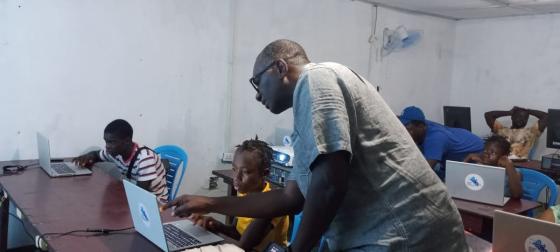Liberia: Local IT Company Launches Free Computer Literacy Program

231Data, an IT company based in Liberia, has introduced a month-long free digital transformation training program in Paynesville, Liberia. This initiative, supported by the Liberia Telecommunications Authority (LTA), is designed for Liberians between the ages of 11 and 35.
The program, which began on January 2nd at the Christian Bible Faith Mission School in Paynesville, aims to provide participants with essential digital skills.
Niahson Porte, CEO of 231Data, stated that this program serves as a pilot project to gather data, which will be crucial for the development of a comprehensive, long-term digital skills education plan in Liberia.
“Our goal is to narrow the digital divide in Liberia by providing fundamental digital skills to a significant portion of the population, with a particular focus on youth, women, and PEMPEM drivers,” says Mr. Porte. “This initiative targets individuals aged 11 to 35, recognizing their need for basic digital proficiency.
“It is no secret that bridging the digital gap in poor countries like Liberia is essential to provide equitable access to education, reduce inequality, enhance economic development, and empower individuals and communities to thrive in today's digital world.” Porte said. “It is a necessary step towards building a more inclusive and prosperous society.”
Bridging the digital gap is crucial for several reasons, mainly accessing digital education and equipment is essential for the education and development of children and students—and in today's increasingly digital world, having the necessary digital skills and literacy is becoming crucial for success in various fields.
In many countries like Liberia, where the majority of children and students have their very first encounter with the Internet via a mobile phone, there is a clear divide between the privileged few who have access to technology and the vast majority who do not. As smartphones become cheaper, the economic barrier to access is lowering. Yet, population growth, rising unemployment and other variables further exacerbate the existing social and economic disparities.
Against this backdrop, 231Data believes that by providing access to digital education, children and students gain the opportunity to improve their knowledge and skills and expand their horizons. Bridging the digital gap can also help in leveling the playing field and reducing inequality.
“By ensuring digital accessibility for all, regardless of their socioeconomic background, we can promote equal opportunities and empower marginalized communities. Furthermore, digital connectivity opens up a world of information and resources that can enhance learning and provide new opportunities,” Porte said in an interview.
He added that with access to digital tools and the internet, children and students can explore a wide range of educational materials, online courses, and virtual libraries. They can access up-to-date information, collaborate with peers and educators, and engage in interactive learning experiences.
With this free computer literacy program, 231Data is working towards the objectives of the World Summit on Information Society (WSIS), a global initiative aimed at addressing the challenges and opportunities in the digital age.
The WSIS, first held in Geneva, Switzerland in 2003, and again in Tunis, Tunisia in 2005, serves as a platform for governments, intergovernmental organizations, civil society, private sector entities, and individuals to discuss and collaborate on ICTs related issues, digital inclusion, governance, and the overall impact of the digital age on society.
As a result, advocacy around digital inclusion, which greatly enhances the quality of education and helps students develop critical thinking, problem-solving, and digital literacy skills, is more resounding. Moreover, bridging the digital gap can have a positive impact on economic development.
In today's digital economy, digital skills are increasingly in demand, Porte said. “By equipping children and students with digital education and skills, we can enhance their future employability and create a workforce that is prepared for the jobs of tomorrow. This, in turn, can contribute to the overall economic growth of the country,” he said.
Meanwhile, the current training program consists of two two-hour sessions per day over two weeks, with each session accommodating 15 trainees. Microsoft training modules, previously utilized in the UK, Ghana, and Nigeria, are being used to cover six modules on introductory computer topics. The aim is to equip participants with basic computer skills within the one-month period.
The program initially plans to train 60 individuals and eventually scale up to reach 10,000 people across the country over the next two years. Mr. Porte expressed gratitude to Minister Worlea Dunah of the Ministry of Post and Telecommunications, Madam Edwina Crump Zackpah, Chairperson of the LTA, and Mr. Abdullah Kamara, CEO of Tamma Corporation, for their collaboration and support in establishing the foundation for a comprehensive digital transformation strategy.
He also expressed the intention to forge partnerships with other institutions, legislators, local authorities, and international organizations to strengthen the nationwide digital transformation initiative. Looking ahead, Mr. Porte expressed the desire to secure funding to provide computers and expand the scope of training.
He emphasized the importance of local involvement, urging county officials to facilitate training spaces and establish digital education centers across the country. Mr. Porte envisions ongoing training for individuals with limited or no digital skills, progressing to more advanced training to ensure a continuous cycle of digital skill development.
He highlighted the correlation between a digitally skilled population and economic advancement, citing the potential for Liberia to achieve similar success in its digital transformation journey as other countries have experienced.
